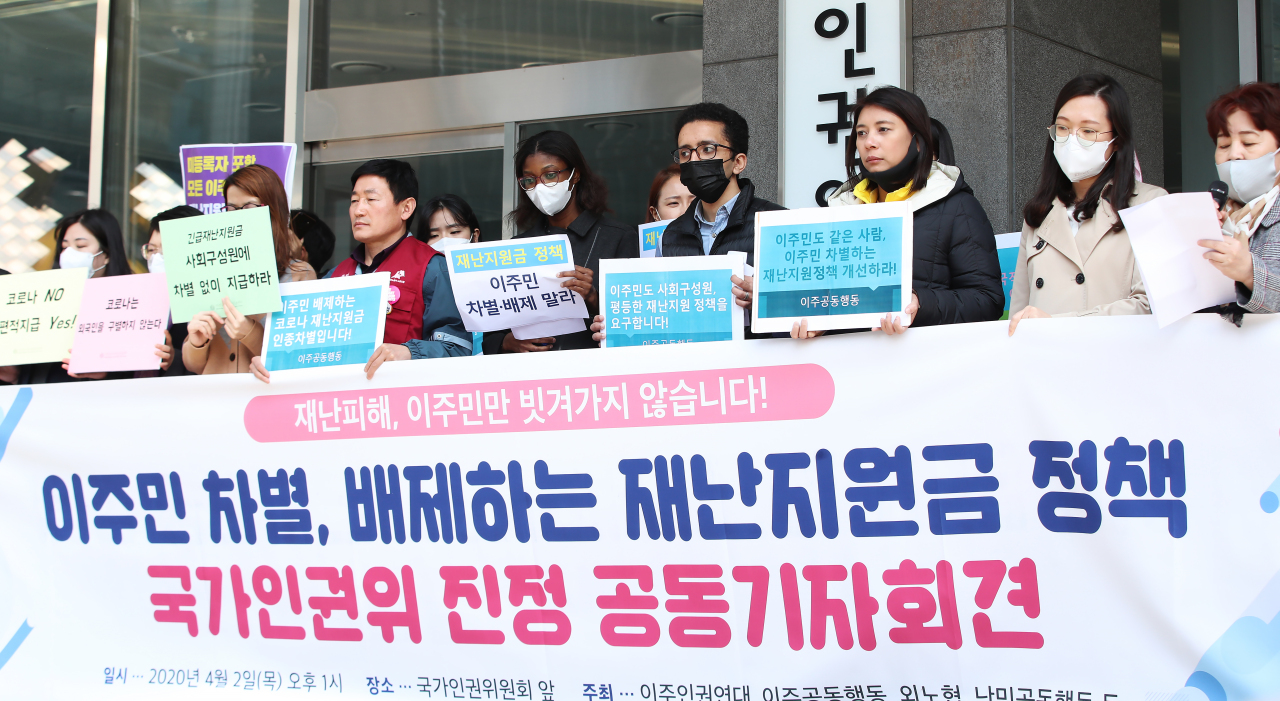Foreign residents shut out of virus relief funds
The city of Ansan is the only municipality giving out relief cash to every resident regardless of nationality
By Ock Hyun-juPublished : April 5, 2020 - 16:28

South Korea’s government and municipalities are introducing direct cash payments to citizens here to help them cope with the economic fallout of a prolonged coronavirus crisis.
Some details are still unresolved, but the government has said that foreign nationals, whether they pay taxes here or not, will largely be excluded from the assistance programs unless they are married to Korean citizens.
“In principle, foreigners are not eligible for the emergency funds. But in case of an international marriage, we will take into account the foreign spouse so that the Korean national will not be disadvantaged (in receiving the payouts),” an official from the Ministry of Health and Welfare said.
“Specific details by case will be confirmed later.”
In a one-off stimulus program, Korea plans to offer cash handouts to all families except those in the top 30 percent income bracket. About 14 million households in the bottom 70 percent will receive relief payments, depending on the size of the household, with the maximum set at 1 million won for a household with four or more people.
Whether a household is eligible for the cash handouts and how much is offered will be decided based on health insurance premiums paid for March. Korea levies health insurance premiums based on individuals’ income.
On top of the funds offered by the central government, a handful of local governments have a separate subsidy plan -- some selectively for low-income earners and others for every citizen.
In Seoul, the country’s capital with a population of some 10 million people, some 1.1 million households in low-income brackets are offered checks of between 300,000 won to 500,000 won. Among foreigners, those legally married to Koreans and belonging to the low-income criteria can receive the funds.
Gyeonggi Province, which surrounds Seoul and has a population of 14 million, gives 100,000 won to every citizen who has a registered address in the province, regardless of income. The province encompasses 31 cities and counties. Foreign citizens, however, are excluded from the scheme for “practical reasons.”
“We give the funds to every citizen registered in Gyeonggi Province to meet citizens’ urgent needs,” said an official from the Gyeonggi Provincial government. “As for foreigners, we have practical difficulties in sorting out who is eligible for the funds, which takes a long time, so we decided to exclude foreigners from the cash program.”
The city of Ansan, where more than 11 percent of its population are foreign residents, is the only municipality giving out cash payouts to foreigners, regardless of whether they are married to Korean nationals. It offers 100,000 won to Koreans and 70,000 won to foreign nationals.
Foreign residents will receive 70 percent of what Koreans get in cash payouts, given that the central government grants to local authorities equal 70 percent of what is allocated for Korean residents, he added. About 80,000 foreign residents in the city are to receive the funds.
“Foreigners are also paying taxes and they are contributing a lot to the city, so we are offering the funds to them,” an official from the city said.
In Korea, 1.21 million foreign nationals are paying into the country’s national health insurance scheme, according to government data. Starting in July, the government has required foreigners residing here for more than six months and Koreans living overseas to join the insurance program.
There are 503,000 foreign households in the country.
A petition was uploaded on the presidential office’s website last week, demanding the government pay emergency relief funds to foreigners living here as well.
“Foreigners living in Korea with legitimate work permits and paying taxes should be able to receive emergency relief funds and allowances for children,” said the petitioner. “Foreign families and children going through this tough time also need help.”
Some 4,500 people had signed the petition as of Sunday afternoon.
“Virus is affecting not only Koreans, but foreigners too. I am living here and paying taxes just like Koreans,” said Udaya Rai, a Nepalese who has been in Korea for 20 years and heads Korea’s first labor union for foreign workers – Migrants Trade Union. “It is an obvious discrimination that we are excluded from the financial support scheme.”
An association of 62 civic groups advocating for refugees and foreign workers filed a petition against the National Human Rights Commission of Korea last week, condemning Seoul and Gyeonggi municipal governments for discriminating based on nationality.
“Foreign residents are members of Korean society but they are invisible in situations hit by disasters,” former lawmaker Jasmine Lee, a Philippines-born naturalized Korean, said at a press conference Thursday. “We need universal social policies that do not discriminate based on nationality and race.”
The direct monetary assistance program comes as the government seeks to help Koreans maintain their livelihoods and prop up the regional economy hit hard by the protracted outbreak of the coronavirus.
If the government’s cash payouts were to boost the coronavirus-hit economy, including foreign residents in the scheme would be more helpful for it to achieve its policy goal, one activist pointed out.
Migrant workers, asylum seekers and those on humanitarian visas -- who are usually hired on temporary contracts in manufacturing and services sectors -- were the first to lose jobs due to the virus, Kim said.
“Foreigners married to Koreans are still included in the country’s welfare system. Those who have no ties to Koreans are the most vulnerable ones,” said Kim Young-ah, executive director for Migration to Asian Peace.
“It is not that Koreans and foreigners here are living in two different economic spheres. If the policy were to revitalize the economy, foreigners need to receive the cash funds so that they can pay for their rent, necessities and so on.”
(laeticia.ock@heraldcorp.com)
-
Articles by Ock Hyun-ju



















![[Today’s K-pop] Treasure to publish magazine for debut anniversary](http://res.heraldm.com/phpwas/restmb_idxmake.php?idx=642&simg=/content/image/2024/07/26/20240726050551_0.jpg&u=)